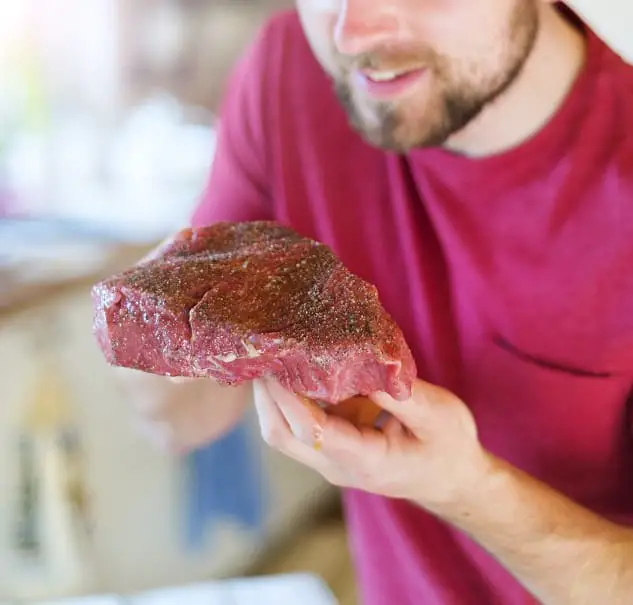While this diet has recently gained popularity, it is still controversial in health and fitness. However, some athletes, including marathon runners, have succeeded with the carnivore diet.
Marathon running is a demanding sport that requires a lot of energy and endurance. As a result, many runners follow a high-carb diet to fuel their bodies for long-distance runs.
However, some runners have started experimenting with the carnivore diet to improve their performance and recovery time.
While there is limited research on the effects of the carnivore diet on athletic performance, some runners claim that it has helped them run faster and recover quicker.
If you’re interested in an easy way to learn more and get your hands on some quality meat, check out the Carnivore Club (affiliate link)

Table of Contents
What is a Carnivore Diet?
The carnivore diet is a type of diet that emphasizes eating only animal products and excludes all plant-based foods.
The diet comprises meat, fish, eggs, and dairy products. The idea behind this diet is that humans evolved to eat a diet high in animal products, and consuming plant-based foods is unnecessary for optimal health.
Proponents of the carnivore diet claim that it can lead to weight loss, improved digestion, and increased energy levels.
However, there is limited scientific evidence to support these claims, and the long-term health effects of this diet need to be better understood.
It is important to note that the carnivore diet is highly restrictive and challenging to sustain. It can also be deficient in specific nutrients in plant-based foods, such as fiber, vitamin C, and potassium.
Therefore, it is essential to consult a healthcare professional before starting this diet.
Benefits of a Carnivore Diet for Marathon Running
For a good reason, many athletes have adopted the carnivore diet in recent years. Here are some of the benefits of a carnivore diet for marathon running:
- Increased energy levels: A carnivore diet can provide a sustained energy source throughout a marathon. Unlike carbohydrates, which can cause spikes and crashes in energy levels, protein and fat provide a more stable energy source.
- Improved recovery: The high protein content of a carnivore diet can aid in muscle recovery after long runs. Protein is essential for repairing and building muscle tissue.
- Reduced inflammation: A carnivore diet eliminates many foods that cause inflammation, such as grains and sugar. This can reduce inflammation, improving recovery time and overall health.
- Weight loss: Many runners find that a carnivore diet helps them lose weight, leading to improved performance and reduced strain on joints.
It’s important to note that a carnivore diet may only suit some. Therefore, it’s essential to consult a healthcare professional before making significant changes to your diet, especially if you have any underlying health conditions.
Additionally, ensuring you get enough nutrients on a carnivore diet is essential. While meat is a good source of protein and fat, it may only provide some of the vitamins and minerals your body needs. Consider incorporating organ meats, such as liver and kidney, into your diet to ensure you get a wide range of nutrients.
Challenges of a Carnivore Diet for Marathon Running
While the carnivore diet has been touted as a way to improve overall health and fitness, there are some challenges that marathon runners may face when following this diet. Here are a few potential challenges:
- Limited carbohydrate intake: One of the biggest challenges of the carnivore diet for marathon runners is the limited intake of carbohydrates. Carbohydrates are the body’s primary energy source during exercise, and without enough of them, runners may experience fatigue, decreased performance, and difficulty recovering from workouts.
- Increased protein intake: The carnivore diet is high in protein, which can be beneficial for building and repairing muscle tissue. However, too much protein can also be harmful, leading to dehydration, kidney damage, and other health problems.
- Limited variety of foods: Another challenge of the carnivore diet is the limited variety of available foods. This can make it challenging to meet the body’s nutritional needs, including those for vitamins, minerals, and fiber.
Despite these challenges, some runners have found success with the carnivore diet. However, it’s important to note that this diet may not suit everyone, and runners should consult with a healthcare professional before making any significant dietary changes.
Tips for Implementing a Carnivore Diet for Marathon Running
Adopting a carnivore diet for marathon running can be difficult, but it can be done successfully with the right approach. Here are some tips to help you implement a carnivore diet for marathon running:
- Gradually transition to the carnivore diet: Giving your body time to adjust to the new diet is essential. Start by gradually reducing your carbohydrate intake and increasing your protein and fat intake.
- Choose good sources of protein: Make sure to choose high-quality sources of protein, such as grass-fed beef, wild-caught fish, and pasture-raised poultry. These protein sources are more nutrient-dense and have a better omega-3 to omega-6 fatty acid ratio.
- Don’t forget about micronutrients: While the carnivore diet primarily focuses on protein and fat, ensuring you’re getting enough micronutrients is essential. Incorporate organ meats like liver and heart into your diet to ensure you get a wide range of micronutrients.
- Stay hydrated: It’s essential to stay hydrated during marathon training and racing. Make sure to drink plenty of water and consider adding electrolytes to your water to replace any loss during exercise.
- Listen to your body: Everyone’s body is different, so listening and adjusting your diet is essential. If you’re feeling fatigued or not recovering well, consider adding some carbohydrates or changing your protein and fat intake.
Remember, the carnivore diet may not be for everyone, and it’s essential to consult a healthcare professional before making significant changes.
However, the carnivore diet can successfully approach marathon training and racing with the right approach and attention to detail.
Now you have a little more understanding of the carnivore diet, check out the Carnivore Club for more information (affiliate link).

Conclusion
While the carnivore diet is gaining popularity among athletes, particularly those in the strength training community, its effectiveness is still being determined for endurance athletes such as marathon runners.
Some athletes have reported positive experiences with the diet, citing increased energy levels and improved recovery times. However, there needs to be more scientific research on the long-term effects of diet on endurance performance.
It is important to note that the carnivore diet is highly restrictive and eliminates many essential sources of nutrients such as fruits, vegetables, and whole grains. If not properly managed, this can lead to nutrient deficiencies and potential adverse health effects. Therefore, it is recommended to consult with a healthcare professional before starting any new diet, particularly one as restrictive as the carnivore diet.
Ultimately, the decision to try the carnivore diet as a marathon runner should be based on individual needs and preferences. It is essential to listen to your body and make adjustments as necessary to ensure proper fueling and recovery.
Incorporating various nutrient-dense foods, including fruits, vegetables, and whole grains, can help ensure a well-rounded and balanced diet to support endurance performance.

Frequently Asked Questions
Can you be a runner on a carnivore diet?
Yes, it is possible to be a runner on a carnivore diet. While the diet consists primarily of animal products, including meat, fish, and eggs, it can still provide the necessary nutrients and energy for endurance exercise, such as running.
Some athletes have reported improved performance and recovery on a carnivore diet. However, consulting with a healthcare professional and monitoring your body’s response to the diet is essential to ensure it meets your needs as a runner.
Can the Carnivore Diet provide enough energy for marathon running?
Yes, the Carnivore Diet can provide enough energy for marathon running.
While the diet restricts carbohydrates, the body’s primary energy source during exercise, it can still provide adequate energy through protein and fat metabolism.
Some athletes have reported improved endurance and performance on a carnivore diet.
Still, consulting with a healthcare professional and monitoring your body’s response to the diet is essential to ensure it meets your needs as a runner.
What are the benefits of the Carnivore Diet for marathon running?
Advocates of the Carnivore Diet for marathon running claim that it can provide several benefits, including:
Improved body composition: The high protein intake on the Carnivore Diet can help build and maintain lean muscle mass, which is essential for endurance athletes like marathon runners.
Reduced inflammation: The diet eliminates many common allergens and inflammatory foods, which may reduce inflammation and improve recovery time.
Increased energy: Some athletes report increased energy and mental clarity on a carnivore diet, which can be beneficial during long-distance running.
Improved digestion: Eliminating fiber and processed foods may improve digestion and reduce gastrointestinal distress during exercise.
However, it is essential to note that extensive scientific research does not support these claims, and individual results may vary. Therefore, consulting a healthcare professional before starting any new diet or exercise regimen is essential.
Are there any risks or drawbacks to the Carnivore Diet for marathon running?
Yes, the Carnivore Diet for marathon running has potential risks and drawbacks. These include:
Nutrient deficiencies: The diet eliminates many plant-based foods that are essential sources of vitamins, minerals, and fiber. This may increase the risk of nutrient deficiencies, negatively impacting athletic performance and overall health.
Increased risk of heart disease: The high intake of saturated fat and cholesterol from animal products may increase the risk of heart disease, which concerns athletes who engage in prolonged endurance exercise like marathon running.
Decreased glycogen stores: The low-carbohydrate nature of the diet can lead to decreased glycogen stores in the muscles, which can negatively impact endurance performance.
Limited food choices: Eliminating many plant-based and processed foods may make obtaining a balanced and varied diet difficult, which can be important for overall health and athletic performance.
Individual variability: It is important to note that individual responses to the diet can vary, and some athletes may not thrive on a carnivore diet. It is essential to consult with a healthcare professional and monitor your body’s response to the diet to ensure it meets your needs as a runner.
Overall, it is essential to carefully consider the potential risks and benefits of the Carnivore Diet for marathon running and to consult with a healthcare professional before making any significant changes to your diet.
What foods are allowed on the Carnivore Diet for marathon running?
The Carnivore Diet for marathon running typically allows the following foods:
Meat: Beef, pork, lamb, chicken, turkey, and other types of meat are allowed on the diet.
Fish and seafood: Salmon, tuna, shrimp, crab, and other types of fish and seafood are allowed.
Eggs: Whole eggs, including the yolk, are allowed.
Dairy: Some diet versions allow for full-fat dairy products like cheese and butter, while others do not.
Animal Fats: Lard, tallow, and other animal fats are allowed.
Water: Water is the preferred beverage on the diet.
It is important to note that the diet typically excludes all plant-based foods, including fruits, vegetables, grains, and legumes. Some diet versions may allow for small amounts of herbs and spices, but these are generally limited.
Why is the carnivore diet so controversial?
The Carnivore Diet is controversial for several reasons:
Lack of scientific evidence: While some studies suggest that a high-protein, low-carbohydrate diet may have benefited from weight loss and specific health conditions, there needs to be more scientific evidence to support the Carnivore Diet specifically. This lack of evidence has led some experts to question the safety and efficacy of the diet.
Nutrient deficiencies: Eliminating many plant-based foods from the diet may increase the risk of nutrient deficiencies, particularly for vitamins, minerals, and fiber. This can negatively impact overall health, and some experts have raised concerns about the long-term effects of the diet.
Potential health risks: The high intake of saturated fat and cholesterol from animal products may increase the risk of heart disease, certain cancers, and other health conditions. Some experts have also raised concerns about the potential impact of the diet on gut health and the microbiome.
Limited food choices: Eliminating many plant-based and processed foods can make obtaining a balanced and varied diet difficult, which can be important for overall health and athletic performance.
Overall, while some individuals may experience benefits from the Carnivore Diet, it is essential to consider the potential risks and drawbacks before making significant changes to your diet. It is also necessary to consult a healthcare professional before starting any new diet or exercise regimen.
What foods should be avoided on the Carnivore Diet for marathon running?
The Carnivore Diet for marathon running typically excludes the following foods:
Plant-based foods: Fruits, vegetables, grains, and legumes are generally excluded from the diet.
Processed foods: Processed meats, snack foods, and other processed foods are generally excluded from the diet.
Sugar and sweeteners: All sugar and sweeteners, including honey and maple syrup, are generally excluded from the diet.
Alcohol: All forms of alcohol are generally excluded from the diet.
Beverages other than water: While some diet versions allow for coffee and tea, others do not. Sugary drinks and other beverages are generally excluded from the diet.
It is important to note that the specific foods allowed or excluded from the diet can vary depending on its version. Therefore, it is essential to consult with a healthcare professional and carefully consider the potential risks and benefits of the diet before making any significant changes to your diet.
How should I prepare for a marathon on the Carnivore Diet?
Preparing for a marathon on the Carnivore Diet may require additional planning and preparation. Here are some tips to consider:
Consult with a healthcare professional: Before starting any new diet or exercise regimen, it is essential to consult with a healthcare professional to ensure that it is safe and appropriate for you.
Monitor your nutrient intake: Because the diet eliminates many plant-based foods, it is essential to monitor your nutrient intake to ensure you get enough vitamins, minerals, and fiber. Consider taking supplements or incorporating organ meats into your diet to help meet your nutrient needs.
Plan your meals and snacks: Plan your meals and snacks to ensure you get enough calories and nutrients to support your training. For example, consider incorporating high-protein foods like beef, chicken, and fish and healthy fats like avocado and olive oil.
Stay hydrated: Drink plenty of water before, during, and after your training runs and the marathon itself.
Practice fueling strategies: Because the diet restricts carbohydrates, it may be necessary to experiment with different fueling strategies during your training and the marathon. Consider incorporating small amounts of carbohydrates, such as honey or fruit, into your fueling plan to help maintain energy levels during long runs.
Monitor your body’s response: Pay attention to how your body responds to the diet and adjust your intake as needed. Consult a healthcare professional to determine the best course of action if you experience adverse side effects or symptoms, such as fatigue or digestive issues.
Is carnivore diet hard on the liver?
The impact of the Carnivore Diet on liver health has yet to be fully understood, and more research is needed to determine its effects on liver function.
However, some studies have suggested that a high-protein diet may increase the risk of liver disease, particularly in individuals with pre-existing liver conditions.
Additionally, the high intake of saturated fat and cholesterol from animal products in the diet may increase the risk of heart disease, negatively impacting liver health over time.
It is important to note that the Carnivore Diet is a highly restrictive diet that eliminates many plant-based foods, which are essential sources of vitamins, minerals, and fiber necessary for overall health, including liver health.
Therefore, it is essential to consult with a healthcare professional and carefully consider the potential risks and benefits of the diet before making any significant changes to your diet.
Should I eat during a marathon on the Carnivore Diet?
Yes, it is generally recommended to eat during a marathon, even if you are following the Carnivore Diet.
While the diet is low in carbohydrates and water’s primary energy source during exercise, it is still important to fuel your body during a marathon to maintain energy levels and prevent fatigue.
Some athletes on the Carnivore Diet may incorporate small amounts of carbohydrates, such as honey or fruit, into their fueling plan to help maintain energy levels during long runs. Others may rely on protein and fat for energy during the marathon.
Experimenting with different fueling strategies during training is essential to determine what works best for you.
Staying hydrated during the marathon and replenishing electrolytes as needed are also important. Consider bringing a carbohydrate drink, gel, and water to sip on during the race. As always, it is essential to consult with a healthcare professional and carefully consider the potential risks and benefits of the diet before making any significant changes to your diet or exercise regimen.
How should I recover after a marathon on the Carnivore Diet?
Recovery after a marathon on the Carnivore Diet is essential to help your body repair and rebuild after the physical stress of the race. Here are some tips to consider:
Rehydrate: Drink plenty of water and electrolytes after the race.
Refuel: Eat a balanced meal with protein, healthy fats, and carbohydrates to help replenish glycogen stores and support muscle recovery.
Rest: Rest and allow your body to recover. Consider taking a day or two off from exercise to allow your body to rest and recover.
Stretch and foam roll: Stretching and foam rolling can help relieve muscle soreness and improve flexibility.
Consider supplements: Take creatine, omega-3 fatty acids, and collagen to support muscle recovery and reduce inflammation.
Monitor your body’s response: Pay attention to how your body responds to the recovery process and adjust your intake as needed. Consult a healthcare professional to determine the best action if you experience any adverse side effects or symptoms.
It is important to note that recovery after a marathon is essential regardless of your diet. Therefore, it is important to consult with a healthcare professional and carefully consider the potential risks and benefits of the diet before making any significant changes to your diet or exercise regimen.
Is the Carnivore Diet suitable for all types of marathon runners?
The Carnivore Diet may not be suitable for all types of marathon runners, and individual results may vary. While some athletes may thrive on a high-protein, low-carbohydrate diet like the Carnivore Diet, others may need to perform better.
Athletes who engage in prolonged endurance exercise like marathon running may require more carbohydrates in their diet to support energy levels and performance. In addition, the low-carbohydrate nature of the Carnivore Diet may need to provide more carbohydrates to help optimize performance for all athletes.
Additionally, the diet eliminates many plant-based foods that are essential sources of vitamins, minerals, and fiber, which may increase the risk of nutrient deficiencies and negatively impact athletic performance and overall health.
Therefore, it is essential to consult with a healthcare professional and carefully consider the potential risks and benefits of the diet before making any significant changes to your diet or exercise regimen. It is also essential to monitor your body’s response to the diet and adjust your intake as needed to ensure that it meets your needs as a runner.

